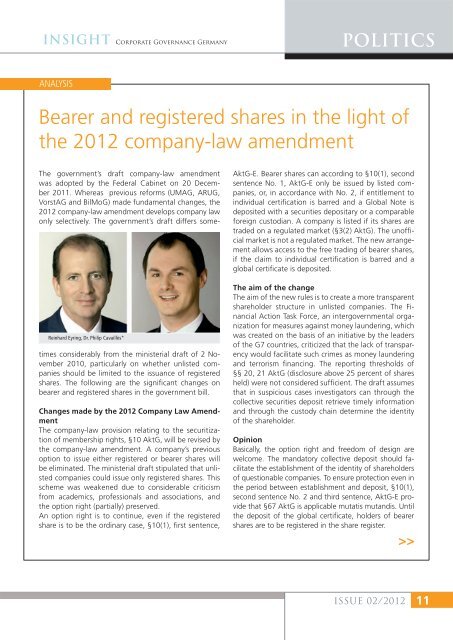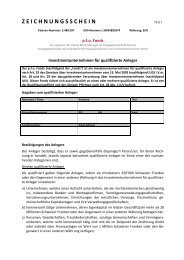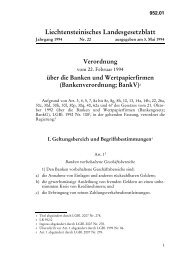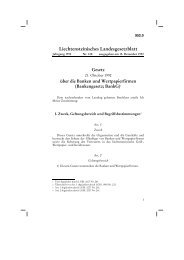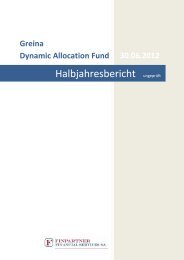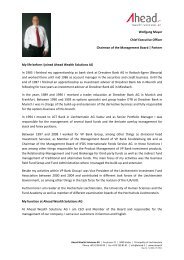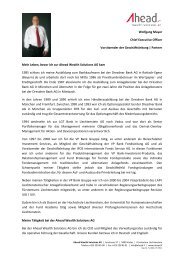iNSiGht - Intro
iNSiGht - Intro
iNSiGht - Intro
You also want an ePaper? Increase the reach of your titles
YUMPU automatically turns print PDFs into web optimized ePapers that Google loves.
insight corporate Governance Germany POLitiCs<br />
ANALYSIS<br />
Bearer and registered shares in the light of<br />
the 2012 company-law amendment<br />
The government’s draft company-law amendment<br />
was adopted by the Federal Cabinet on 20 December<br />
2011. Whereas previous reforms (UMAG, ARUG,<br />
VorstAG and BilMoG) made fundamental changes, the<br />
2012 company-law amendment develops company law<br />
only selectively. The government’s draft differs some-<br />
Reinhard Eyring, Dr. Philip Cavaillès*<br />
times considerably from the ministerial draft of 2 November<br />
2010, particularly on whether unlisted companies<br />
should be limited to the issuance of registered<br />
shares. The following are the significant changes on<br />
bearer and registered shares in the government bill.<br />
Changes made by the 2012 Company Law Amendment<br />
The company-law provision relating to the securitization<br />
of membership rights, §10 AktG, will be revised by<br />
the company-law amendment. A company’s previous<br />
option to issue either registered or bearer shares will<br />
be eliminated. The ministerial draft stipulated that unlisted<br />
companies could issue only registered shares. This<br />
scheme was weakened due to considerable criticism<br />
from academics, professionals and associations, and<br />
the option right (partially) preserved.<br />
An option right is to continue, even if the registered<br />
share is to be the ordinary case, §10(1), first sentence,<br />
AktG-E. Bearer shares can according to §10(1), second<br />
sentence No. 1, AktG-E only be issued by listed companies,<br />
or, in accordance with No. 2, if entitlement to<br />
individual certification is barred and a Global Note is<br />
deposited with a securities depositary or a comparable<br />
foreign custodian. A company is listed if its shares are<br />
traded on a regulated market (§3(2) AktG). The unofficial<br />
market is not a regulated market. The new arrangement<br />
allows access to the free trading of bearer shares,<br />
if the claim to individual certification is barred and a<br />
global certificate is deposited.<br />
The aim of the change<br />
The aim of the new rules is to create a more transparent<br />
shareholder structure in unlisted companies. The Financial<br />
Action Task Force, an intergovernmental organization<br />
for measures against money laundering, which<br />
was created on the basis of an initiative by the leaders<br />
of the G7 countries, criticized that the lack of transparency<br />
would facilitate such crimes as money laundering<br />
and terrorism financing. The reporting thresholds of<br />
§§ 20, 21 AktG (disclosure above 25 percent of shares<br />
held) were not considered sufficient. The draft assumes<br />
that in suspicious cases investigators can through the<br />
collective securities deposit retrieve timely information<br />
and through the custody chain determine the identity<br />
of the shareholder.<br />
Opinion<br />
Basically, the option right and freedom of design are<br />
welcome. The mandatory collective deposit should facilitate<br />
the establishment of the identity of shareholders<br />
of questionable companies. To ensure protection even in<br />
the period between establishment and deposit, §10(1),<br />
second sentence No. 2 and third sentence, AktG-E provide<br />
that §67 AktG is applicable mutatis mutandis. Until<br />
the deposit of the global certificate, holders of bearer<br />
shares are to be registered in the share register.<br />
>><br />
issue 02/2012 11


